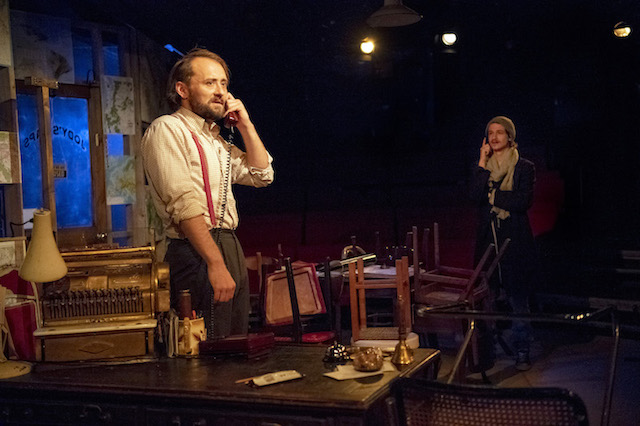"Lonely Planet has given me more than I ever gave to it." - Steven Dietz
What particularly inspired you to pick up a pen and start writing Lonely Planet back in 1992? Can you describe the moment and time that the idea was conceived and the writing process itself?
Three things. I had lost friends to this insidious disease. I had two favourite actors in Seattle who I wished to write a play for (having never dared to write a two-character play). I had become fascinated with maps as signifiers of presence, and chairs as signifiers of absence.
What does it mean to you to have your play revived once again?
We do not decide what lasts. The fact that this play still has something to convey to audiences 25 years later is extremely meaningful and surprising to me. It is a trace of the man and the writer I was in 1992. I wrote of the moment I was in. The moment my friends and loved ones were in. That moment, as it turns out, had more to say than I ever could have imagined.
Will the revival be exactly the same, or do some elements deviate from the original?
The text is unchanged. The production will be unique to those involved.
What message did you want to send to audiences when the play was written?
No one message is possible since there is no such thing as a uniform response to a play. I would hope audiences would reflect on their friendships since that is the core of the play.
Do you think this year's revival of Lonely Planet serves a different purpose for audiences now that the uncontrollable AIDS epidemic of the 1980s and 90s is seemingly more under control thanks to medication and preventative education?
This was never a play about the disease. This is a play about fear. A play about friendship. The medical strides are impressive, but the disease continues to tell its story. There is no medicine for fear.
What are you most proud of about your play, Lonely Planet?
The chance I’ve had to see remarkable actors around the world bring Carl and Jody to life. The passion with which theatres large and small have embraced this story. Lonely Planet has given me more than I ever gave to it. It owes me nothing. I owe it a great debt.
How does Lonely Planet manage to tactfully include bits of comedy without appearing tone deaf in regard to the serious subject matter?
I believe all humour is truth. The opposite of tragedy is not comedy; it is apathy. Humour is a way to invite an audience to invest. Without that investment, the more serious issues are moot.
Although sequels are rare in theatre, would you ever consider writing a sequel to Lonely Planet in the future?
I have written two plays about friendship: Lonely Planet and Last of the Boys. I hope someday to write a third.
What is the main reason why you think theatregoers should go and see Lonely Planet?
The actors. The humor. The friendship. The faith. In your house, you have a favourite chair. What will become of it when you are gone?
Now playing at Trafalgar Studios in conjunction with this year's Pride, the London production has been receiving much praise for its two main actors, Alexander McMorran and Aaron Vodovoz, who have managed to render some "wonderfully detailed performances" (WhatsOnStage). Their characters help bring to light the cruel world we live in and how humour can help us cope with the tragedies caused by human ignorance.
Lonely Planet is performed in front of a small audience, making its heartbreaking scenes a truly intimate experience. Space to see the show is limited and it would be a pity to miss out on this moving production, especially with the Pride in London Parade just around the corner.
For tickets to see Steven Dietz's Lonely Planet, click here.

